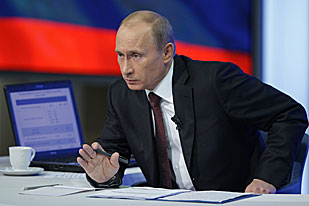Russia to modernise nuclear arsenal
Dmitry Medvedev makes announcement during wide-ranging televised end-of-year interview.

He said Russia and the US were close to a new deal on reducing their vast Cold War arsenals of nuclear weapons and said that he had “trustworthy relations” with Barack Obama, the US president.
Army a ‘shambles’
Speaking to Al Jazeera, Fred Weir, correspondent for the Christian Science Monitor newspaper in Moscow, said he was not surprised at Medvedev’s announcement.
Weir said: “Russia is heavily dependent on its strategic [nuclear] deterrent, it is all it has got to defend itself with because its armed forces in general are a shambles.”
Some Kremlin watchers see the format of the end-of-year interview, televised live on The First, Russia, and NTV channels, as the president’s answer to the popular annual question and answer sessions held by Vladimir Putin, the country’s prime minister.
Weir said: “Both Putin and Medvedev are clearly eyeing the presidency in 2012, that doesn’t mean that they’re both going to run in an open election against each other.
“There will be some bureaucratic process in which it will be decided which one of them will be the candidate.
“But the public side of that is that you’ve got to get your face out there, you’ve got to get your popularity ratings up if you’re going to make the argument behind closed doors that you’re the better candidate.
“You have to have these public credentials and I think that’s what’s going on now. We’ve certainly seen both these guys on the air an awful lot in the past month.”
Economic crisis
Medvedev said Russia’s exit from the economic crisis will be slow and the world’s biggest energy exporter will remain extremely vulnerable unless it can kick its dependence on oil and gas sales.
He said Russian gross domestic product was likely to have contracted by at least 8.7 per cent this year, though he said economic growth could total 2.5 to five per cent in 2010.
“The exit from the crisis will be fairly slow. We still have an economic system which is based on the energy market,” he said.
“Without modernisation, our economy has no future even though it relies on huge natural riches.”
Medvedev has repeatedly called for reducing Russia’s dependence on oil and gas exports since taking over as Kremlin chief in May 2008.
A decline in annual GDP of 8.7 per cent would be Russia’s worst economic result since 1994, when the economy, trapped in the chaos which followed the 1991 fall of the Soviet Union, contracted by more than 10 per cent.
Prison reform
Medvedev also pledged to overhaul Russia’s largely Soviet-inherited prison system following the sudden death in jail of a lawyer last month.
“Our system of the execution of punishment has not changed for decades, there is no order. We need to bring it about,” he said.
 |
| Kremlin watchers see the format of the interview as Medvedev’s answer to Putin’s Q&A sessions [AFP] |
Earlier this month, he sacked around 20 top prison officials, including top prisons chiefs for Moscow and St Petersburg, in one of the largest shake-ups at the Federal Service for the Execution of Punishment, the successor to the Soviet-era Gulag prison system.
The mass firings came after the sudden death of Sergei Magnitsky, a high-profile lawyer, in jail, where he had been held for over a year in pre-trial detention.
His requests for medical treatment had been denied.
Officials have insisted the reshuffles had nothing to do with his death but were part of a sweeping reform as well as an internal probe that exposed “systemic violations” in medicial treatment in prisons.
Medvedev, speaking about his decision to sack the top prison officials for the first time, did not mention Magnitsky by name but said: “We have to understand that there is no need whatsoever to slam people into prison at the stage of preliminary investigation for some types of economic crimes, crimes related to tax activities.
“There’s a need to conduct investigation in accordance with law, to seek to obtain quality evidence and not to extract it with other means.”